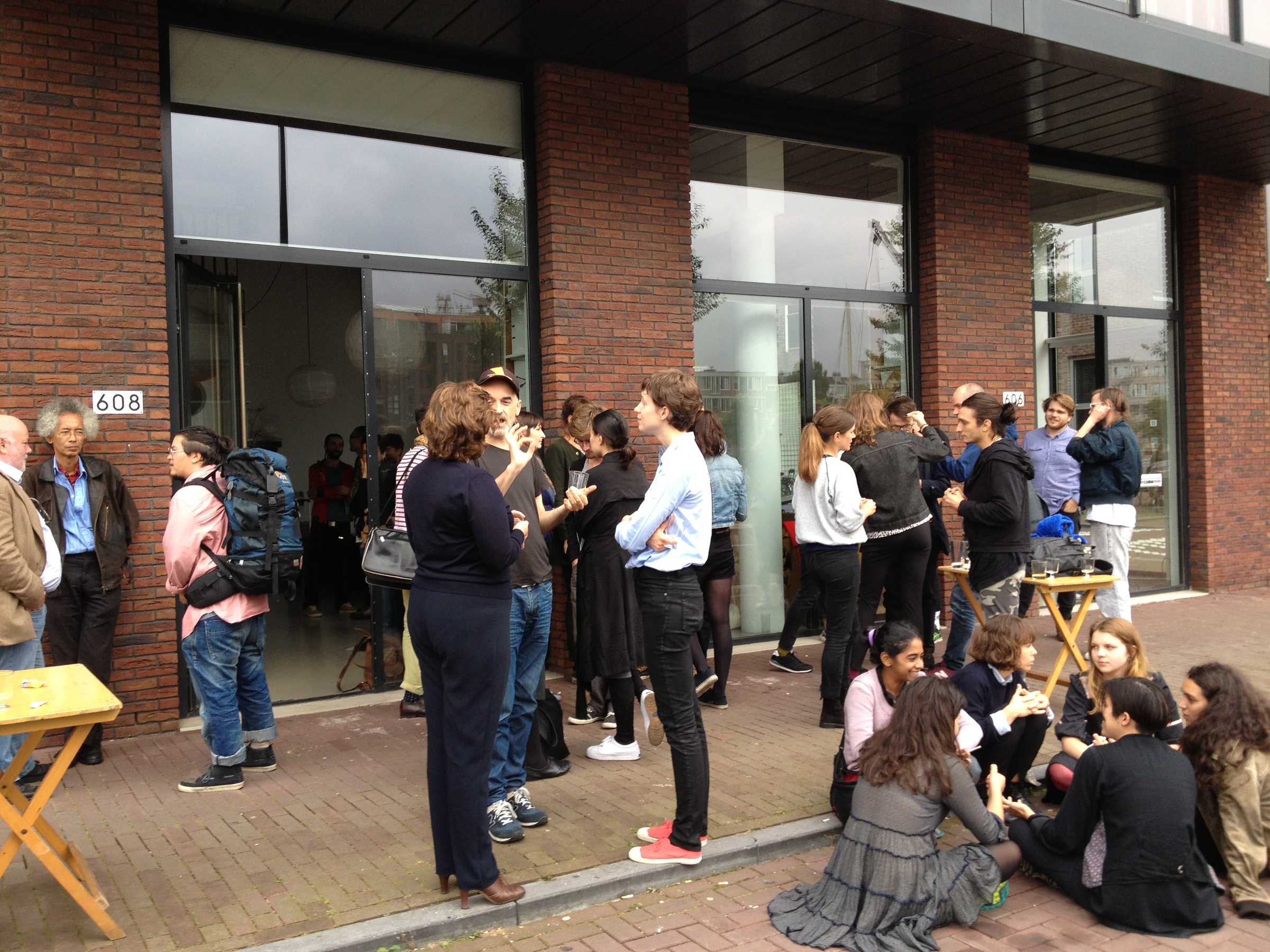2014 -2015 Roaming Academy / If I Can't Dance I Don't Want To Be Part Of Your Revolution & Jon Mikel Euba present: ACTION UNITES, WORDS DIVIDE (ON PRAXIS, AN UNSTATED THEORY)
In collaboration with TAAK: Summerschool Marfa 2015
Participants: Maria Barlasov, Michelle Browne, Charlie Dance, Martha Jager, Jammie Nicholas, Panagiotis Panagiotakopoulos, Marie-Andree Pellerin, Mathilde Sauzet, Malina Suliman, Melissa Tun Tun
In the picture: In front of the If I Can't Dance-office in Amsterdam, October 2014. Standing in the middle: Jon Mikel Euba in conversation with Tanja Baudoin and Frederique Bergholtz (photo credit Maria Barlasov).
ACTION UNITES, WORDS DIVIDE (ON PRAXIS, AN UNSTATED THEORY) is a year-long course conceived by artist Jon Mikel Euba at the invitation of If I Can't Dance, I Don't Want To Be Part Of Your Revolution.The course is coordinated by If I Can't Dance curators Tanja Baudoin and Susan Gibb.
Over the course Jon Mikel Euba engages in monthly workshop sessions with the group, described by the artist below, and individual face-to-face meetings with each student. Artist Itziar Okariz is invited as a recurring guest tutor. The course includes a two-week trip to Marfa, Texas, organized in collaboration with TAAK, that follows on from the workshop sessions. The trip encompasses workshops and excursions that engage with the site and legacy of Marfa.
If I Can't Dance produces art works and thematic programmes. Departing from a spirit of open questioning and long term enquiry with artists, If I Can't Dance is dedicated to exploring the evolution and typology of performance and performativity in contemporary art. www.ificantdance.org
Course description by Jon Mikel Euba
ACTION UNITES, WORDS DIVIDE (ON PRAXIS, AN UNSTATED THEORY)
"Over the past few years I have been working on a form of artistic collaboration that allows for the development of personal bonds between participants, through a real working experience. This collaboration consists in bringing together a number of volunteers – people who did not previously know each other – in such a way, that during a limited time period, they are able to create whatever they require to produce a collective shooting or a live event, adapted both to the number of people involved and to each person's specific capabilities. These works are based on the concept of 'first take / single take', which consists in entirely avoiding the idea of preparation, understood as a prior rehearsal geared towards a subsequent (re)presentation, in such a way that the work or situation must take shape at the same time as it is 'rehearsed'. This technique can be seen as a militant means of avoiding, at all cost, the convention implicit in the idea of the 'Project'. In most of these works there is a fundamental involvement of different recording instruments, incorporated as an issue to be dealt with within the event itself. The result of this first take allows the work to take shape repeatedly: whether it be through a variation/rotation of the people involved, for whom it will always be their 'first time'; or through a subsequent construction derived from the editing of the recorded material.
The course
The course will include two parts. In the first, involving an explanation of production conditions, participants will look over other works that will become pre-production material, gradually contextualising their approach to the subsequent practical exercise. This phase will encourage reflective thought, while underscoring the fact that the aim is not to generate a debate, but rather to attract different people towards a certain subjectivity; to make shareable a subjective creative experience that, in the course of the action, will become educational. Here we analyse specific problems based on readings and/or viewings of different materials (examples of specific production strategies and practices). Different materials will be approached in the course of this first phase, with the aim of defining a shared space that enables communication; a space to analyse conceptual approaches, contents, and experimental solutions developed earlier, which can then be applied to different purposes. During the subsequent collective production/practical working phase, we will define an exercise or set of exercises in connection to questions regarding performance, production and dissemination, with a particular focus on issues related to recording.
Throughout the workshop we will pay particular attention to 'technical' issues, such as:
- On specific strategies for separating the performer's body from that of the mediating instrument, and the instrumentalisation of the camera as a mediator.
- On subjectivity and objectivity, what is objective view (camera's external view) + subjective view (person's internal view) = objectivised view.
- On the ideology implicit in the choice of certain production processes and media.
- On restrictions, stressing the limitation on materials and time.
- On production and zero expense, when to delegate and what to delegate.
- On writing in order to force expression, sharing the creation of my 'writing method'.
- On Score versus Storyboard.
With ACTION UNITES, WORDS DIVIDE (ON PRAXIS, AN UNSTATED THEORY) I propose the creation of an experimental workshop where I am not interested in setting or defining exercises that are consumed in their execution as a presumed educational experience; but rather where my intent is to share with other agents the real artistic process and problems that I am myself immersed in".
ACTION UNITES, WORDS DIVIDE (ON PRAXIS, AN UNSTATED THEORY) from Month to Month

